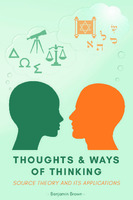Thoughts and Ways of Thinking
Source Theory and Its Applications
Abstract
"Why do we think differently from one another? Why do religious people adhere to their faith even against reason, whilst atheist thinkers label it “nonsense”? Why do some judges turn more to moral values and others less? Why do we attach different meanings to the same words? These questions can be tackled on psychological or sociological levels, but we can also analyze the subjects on the epistemological level. That is the purpose of this book.
Thoughts and Ways of Thinking offers Source Theory as a single explanation for epistemic processes and their religious, legal and linguistic derivatives. The idea is simple: our senses, our understanding, our memory, the testimonies that we trust, and many other objects transmit data to us and so shape our beliefs. In this function they serve as our truth sources. Different beliefs stem from different sources or different hierarchies between same sources. This notion is formalized here through the new tool of Source Calculus, and, after balancing its relativistic consequences by adding pragmatic constraints, it is applied to the philosophies of religion, law and language. With this unified theory, old doubts are framed in new perspectives, and some of them even find their solution."
Keywords
reason and revelation conflict; relativism; source theory; naming; sources of law; truth; Axiom; Calculus; Data; Epistemology; GodDOI
10.5334/bbhISBN
9781911529217;9781911529224;9781911529231OCN
1030821177Publisher
Ubiquity PressPublisher website
https://www.ubiquitypress.com/Publication date and place
2017Classification
Philosophy: epistemology and theory of knowledge
Philosophy: logic
Religion and beliefs
Jurisprudence and general issues


 Download
Download